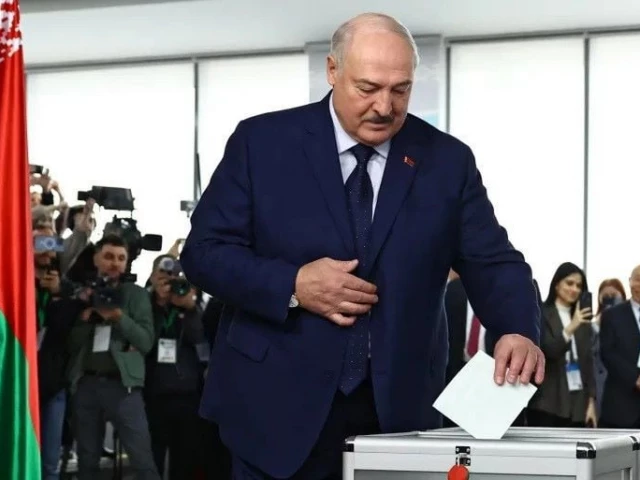Belarus’ Lukashenko poised to extend 29-year rule with landslide exit poll results
First presidential election after 2020 vote sparked protests over fraud amid crack down from the government

Belarusian President Alexander Lukashenko is on course to secure a seventh term in office, with exit polls showing him receiving 87.6% of the vote in Sunday’s presidential election. The results, broadcast on state TV, suggest the longtime leader is extending his 29-year grip on power.
This is the first presidential election in Belarus since the 2020 vote, which sparked mass protests over allegations of widespread fraud. Following the demonstrations, Lukashenko’s government cracked down on dissent, imprisoning more than 1,000 people, including Nobel Peace Prize laureate Ales Bialiatski.
The vote comes as Belarus remains closely aligned with Russia, even allowing its territory to be used as a staging ground for Moscow’s invasion of Ukraine in 2022.
Lukashenko defiant
Speaking in Minsk after casting his ballot, Lukashenko described Belarus as a “tough democracy,” asserting that his government does not suppress dissent. “All our opponents and enemies should understand: we will never repeat what happened in 2020,” he said, referring to the protests.
Despite Lukashenko’s claims, opposition voices have decried the election as undemocratic. European Union foreign policy chief Kaja Kallas called the vote a “sham” and said Lukashenko lacks legitimacy.
Opposition silenced
The election has been marked by limited campaigning and low public enthusiasm. Lukashenko himself said he was “too busy running the country” to campaign actively. His four challengers are largely viewed as loyalists, selected to give the vote an air of legitimacy.
Sergei Syrankov, the Communist Party candidate, has publicly supported Lukashenko, as have other contenders. Opposition figures remain in exile or imprisoned, and approximately 300,000 Belarusians who fled the country after the 2020 crackdown were barred from voting abroad.
No appetite for protests
The streets of Belarus remain quiet, with little sign of resistance. Fear of arrest has silenced dissent, while even opposition groups abroad have urged caution, saying now is not the time to protest.
Some analysts suggest Lukashenko may be seeking to improve relations with the West, allowing foreign journalists to cover the election. Al Jazeera’s Bernard Smith noted that this could signal a strategic shift as Belarus positions itself for a potential post-war landscape in the region.
‘Europe’s last dictator’
Lukashenko, often referred to as “Europe’s last dictator,” has ruled Belarus since 1994. His administration relies heavily on economic and political support from Russia.
Critics say this election further entrenches his authoritarian rule, leaving little room for genuine opposition or reform. However, with protests crushed and dissent stifled, Lukashenko appears firmly in control of the country’s future.





1725099588-0/BeFunky-(41)1725099588-0-208x130.webp)













COMMENTS
Comments are moderated and generally will be posted if they are on-topic and not abusive.
For more information, please see our Comments FAQ